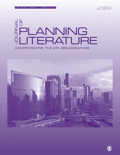
JOURNAL OF PLANNING LITERATURE
Scope & Guideline
Unveiling Trends in Urban and Regional Planning
Introduction
Aims and Scopes
- Urban Planning Theory and Practice:
The journal focuses on the development and critique of urban planning theories, exploring their application in real-world contexts and their implications for policy and practice. - Social Justice and Equity:
A significant emphasis is placed on understanding and addressing issues of social justice, equity, and inclusion within urban planning, particularly in marginalized communities. - Sustainability and Resilience:
The journal investigates sustainable planning practices and resilience strategies in the face of climate change, urbanization, and other socio-environmental challenges. - Public Participation and Community Engagement:
Research is dedicated to enhancing public participation in planning processes, examining the dynamics of community engagement, and the role of stakeholders in decision-making. - Innovative Planning Methodologies:
The journal promotes the use of innovative methodologies, including qualitative, quantitative, and participatory approaches, to advance planning research and practice. - Interdisciplinary Approaches:
Recognizing the complexity of urban issues, the journal encourages interdisciplinary research that integrates insights from various fields, such as economics, sociology, geography, and environmental science.
Trending and Emerging
- Digital Innovation in Planning:
There is a growing emphasis on the integration of digital technologies and data analytics in urban planning, exploring how these tools can enhance decision-making and community engagement. - Climate Change Adaptation:
Research focusing on climate resilience and adaptation strategies is on the rise, reflecting the urgent need for planning frameworks that address environmental challenges and promote sustainability. - Equity and Inclusion in Urban Spaces:
Recent publications highlight the importance of equity in urban planning, with a focus on creating inclusive spaces that cater to diverse populations and address systemic inequalities. - Health and Urban Planning:
The intersection of public health and urban planning is gaining traction, exploring how planning decisions impact community health outcomes and well-being. - Community-led Development:
Emerging themes highlight the role of community-led initiatives in urban planning, emphasizing grassroots movements and local knowledge in shaping urban environments. - Resilience and Recovery from Crises:
The journal is increasingly publishing research on resilience strategies and recovery frameworks in the wake of crises, such as pandemics or natural disasters, and their implications for urban planning.
Declining or Waning
- Traditional Urban Design:
There has been a noticeable decline in focus on traditional urban design principles, with a shift towards more contemporary and innovative approaches that prioritize sustainability and community engagement. - Static Planning Models:
Static models of planning that do not account for dynamic urban changes and community input are becoming less relevant as the field moves towards more adaptive and flexible planning frameworks. - Single-disciplinary Approaches:
Research that adheres strictly to a single discipline is waning, as the journal increasingly emphasizes interdisciplinary collaboration to address complex urban issues. - Top-down Planning Frameworks:
There is a diminishing emphasis on top-down planning frameworks that exclude community voices, as the journal promotes participatory approaches that empower local stakeholders.
Similar Journals
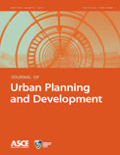
JOURNAL OF URBAN PLANNING AND DEVELOPMENT
Advancing Knowledge in Urban Design and Engineering.The JOURNAL OF URBAN PLANNING AND DEVELOPMENT, published by the ASCE-AMER SOC CIVIL ENGINEERS, stands as a pivotal platform in the realms of urban studies, civil and structural engineering, and development. With an ISSN of 0733-9488 and E-ISSN of 1943-5444, this journal aims to disseminate high-quality research addressing critical urban planning challenges, fostering innovative solutions, and contributing to sustainable development practices. Spanning from its inception in 1979 to the anticipated issues up to 2024, the journal proudly occupies the Q2 category across multiple disciplines, including Civil and Structural Engineering, Development, Geography, Planning and Development, and Urban Studies. Its noteworthy Scopus rankings reflect its influence, notably being positioned in the 76th percentile in Urban Studies. With no open access options currently available, the journal remains a selective forum for scholarly discourse, attracting researchers, professionals, and students eager to engage with cutting-edge developments in urban planning and design.

Italian Journal of Planning Practice
Exploring contemporary challenges in planning and development.Italian Journal of Planning Practice is a premier Open Access journal dedicated to advancing knowledge in the fields of architecture, geography, planning, and urban studies. Published by the Italian Journal Planning Practice, this journal has been a vital platform for scholarly discourse since its inception in 2011, providing a rich repository of research that reflects contemporary issues in urban development and planning practices. With an ISSN of 2239-267X and operating from Rome, Italy, the journal serves a global audience, enhancing accessibility and fostering collaboration among researchers, professionals, and students alike. While currently positioned in the Q4 category across key disciplines, it continues to strive for excellence, encouraging submissions that push the boundaries of knowledge. As an Open Access journal, it promotes unrestricted access to its content, empowering a wider audience to engage with its findings and perspectives. In a rapidly changing urban landscape, the Italian Journal of Planning Practice stands as a crucial resource for innovative planning methodologies and research insights.

Journal of Regional and City Planning
Innovating urban planning for dynamic environments.Journal of Regional and City Planning, published by ITB JOURNAL PUBL, is a pivotal platform dedicated to advancing research in the fields of urban studies, geography, and development. Established in Indonesia, this esteemed journal (ISSN: 2502-6429) serves as an integrative forum for scholars, professionals, and students to explore the complex dynamics of regional and city planning within the context of rapidly changing urban environments. With a commendable Scopus ranking that places it in the Q3 category for Development and Geography and Q2 for Urban Studies, the journal emphasizes quality scholarship aimed at informing policy and practice between 2017 and 2024. Although currently not available in open access, it maintains a solid reputation for its rigorous peer-reviewed articles that contribute significantly to the academic discourse and practical frameworks in urban and regional development. Its commitment to fostering dialogue on sustainable development makes it a vital resource for anyone involved in planning and policy-making.

Ciudad y Territorio-Estudios Territoriales-CyTET
Uncovering Innovations in Geography and Urban DevelopmentCiudad y Territorio-Estudios Territoriales-CyTET, published by the MINISTERIO FOMENTO, CENTRO PUBLICACIONES, is a premier journal dedicated to the interdisciplinary exploration of urban and regional studies. With an ISSN of 1133-4762, this Spanish journal serves as a vital platform for researchers and practitioners interested in the dynamics of geography, planning, and development. Recognized in the Q2 quartile for both Geography, Planning and Development and Urban Studies for 2023, CyTET represents a significant contribution to academic discourse, ranked at 145th in Urban Studies and 542nd in Geography, Planning and Development within the Scopus database. Notably, the journal’s converged issue years from 2014 to 2024 emphasize its ongoing commitment to staying current with the rapidly evolving challenges and innovations in urban environments. Although not Open Access, CyTET provides invaluable insights and research findings that are critical for professionals, scholars, and students aiming to enhance their understanding and impact in the realm of territorial studies.
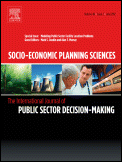
SOCIO-ECONOMIC PLANNING SCIENCES
Navigating the complexities of socio-economic systems.SOCIO-ECONOMIC PLANNING SCIENCES, published by Elsevier Science Inc, is a leading journal in the interdisciplinary fields of economics and social sciences, with a strong focus on planning and development strategies from a socio-economic perspective. With an impact factor reflecting its prestigious standings, it has earned Q1 rankings in multiple categories, including Economics and Econometrics, Geography, Planning and Development, and Strategy and Management as of 2023. Its rigorous peer-reviewed framework ensures that the research disseminated is of the highest quality, making it a crucial resource for researchers, practitioners, and policymakers alike. The journal, which has been in continuous publication since 1967, also benefits from a wide reach through Scopus rankings, placing it in the top percentiles for numerous academic disciplines. By facilitating access to innovative methodologies, applied theories, and empirical analyses related to socio-economic planning, SOCIO-ECONOMIC PLANNING SCIENCES aims to foster a deeper understanding of interconnected social and economic systems, thus contributing to informed decision-making processes across various sectors.
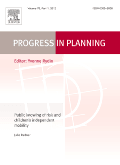
PROGRESS IN PLANNING
Exploring New Dimensions in Geography and DevelopmentPROGRESS IN PLANNING is a premier academic journal published by PERGAMON-ELSEVIER SCIENCE LTD, renowned for its impactful contributions to the fields of geography, urban planning, and development. With an impressive impact factor situating it in the Q1 quartile of its category for 2023, this journal ranks a notable #38 out of 821 in the Scopus listings, placing it in the 95th percentile within the realm of social sciences. Since its inception in 1973, the journal has established itself as a critical platform for the dissemination of innovative research and practical insights, fostering a deeper understanding of contemporary urban challenges and planning strategies. Although currently not offering open access, PROGRESS IN PLANNING continues to attract a diverse array of submissions, providing a vital resource for researchers, professionals, and students seeking to advance their knowledge and contribute to the evolution of planning practices worldwide.
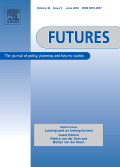
Futures
Envisioning the Path ForwardFutures is a renowned academic journal published by Elsevier Science Ltd, dedicated to advancing the understanding of future studies within a multidisciplinary framework. With a focus on topics spanning business and international management, development, as well as sociology and political science, Futures is ranked in the Q1 quartile for all three categories in 2023, underscoring its pivotal role in fostering innovative discussions and research. The journal, operating since 1968 and set to continue its legacy through 2024, offers a platform for scholars and practitioners to explore critical predictions and emerging trends shaping our global future. Although it is not an open-access journal, its wide circulation ensures a significant reach among academics and professionals keen on exploring the dynamics influencing societal development and strategic planning. By contributing to this esteemed publication, authors have the opportunity to enhance their visibility and engage with a vibrant community committed to transformative knowledge.
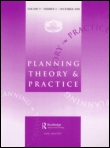
Planning Theory & Practice
Innovating methodologies for impactful planning research.Planning Theory & Practice is a premier academic journal dedicated to the exploration and advancement of urban and regional planning, published by Routledge Journals, Taylor & Francis Ltd. With a significant impact factor, the journal proudly holds the prestigious Q1 status in the Geography, Planning, and Development category, as evidenced by its remarkable ranking of #139 out of 821 in Scopus, placing it within the top 83rd percentile of its field. Since its inception in 2000, the journal has served as a vital platform for researchers, professionals, and students seeking to contribute to the body of knowledge in planning theory, practice, and policy innovation. While it currently does not offer open access options, its rich, peer-reviewed content is accessible through numerous academic databases, ensuring a wide-reaching impact in the scholarly community. Positioned at the intersection of theory and practice, Planning Theory & Practice continues to influence contemporary discourses and methodologies in the field, fostering meaningful dialogue and development in planning research across the globe.
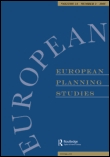
EUROPEAN PLANNING STUDIES
Advancing Urban Insights for Sustainable FuturesEUROPEAN PLANNING STUDIES is a leading journal in the field of urban studies, published by Routledge Journals, Taylor & Francis Ltd. Since its inception in 1993, this esteemed publication has been pivotal in advancing the discourse on geographical, planning, and developmental issues across the European landscape. With a commendable 2023 Q1 rating in the Geography, Planning, and Development category and a remarkable rank of #88 out of 821 in Scopus, the journal is recognized for its rigorous peer-reviewed articles that provide innovative insights and critical analyses. Although the journal does not offer open access, it caters to a diverse readership, including researchers, professionals, and students, ensuring a comprehensive understanding of contemporary planning challenges and strategies. The journal's objectives include fostering interdisciplinary dialogue among planners, policymakers, and academics, making it an essential resource for those engaged in shaping sustainable urban environments and informed spatial governance in Europe and beyond.
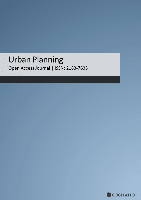
Urban Planning
Connecting scholars and practitioners for impactful urban planning.Urban Planning is a leading academic journal published by COGITATIO PRESS, devoted to advancing the field of urban studies through rigorous research and innovative practice. Established as an Open Access journal in 2016, it offers a platform for scholars and practitioners alike to disseminate knowledge on urban development, spatial planning, and community engagement. With an impressive ranking in the Q1 category for Urban Studies and a notable Scopus rank of #71 out of 279, it reflects the journal's commitment to excellence and influence within its discipline. Based in Lisbon, Portugal, and dedicated to a global audience, Urban Planning encourages interdisciplinary collaboration and seeks to address the pressing challenges faced by urban areas, making it an essential resource for researchers, professionals, and students passionate about shaping sustainable cities. The journal, which contributes to the academic discourse through a robust review process and encourages contributions that engage diverse voices, is set to converge its insights from 2016 to 2025, solidifying its role as a pivotal resource in the urban studies field.